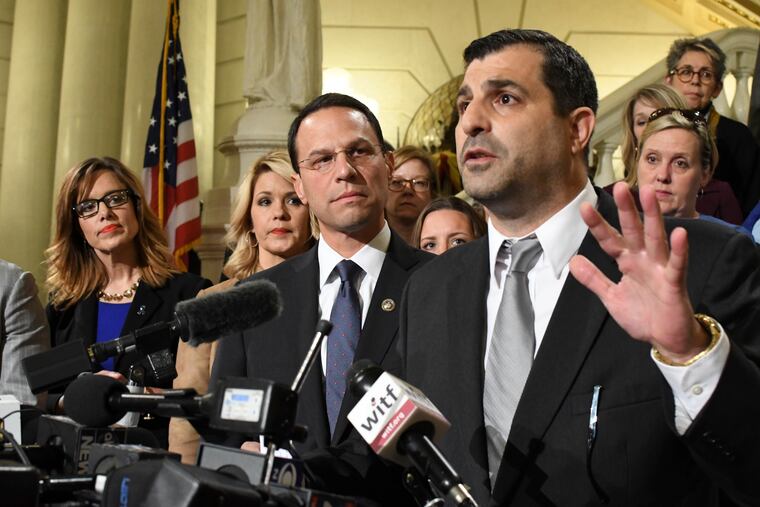Time for another run at helping Pa. child sex abuse survivors | John Baer
Months after failing to reform state law in order to help child sex abuse victims, the Pa. legislature is getting ready to try again.

It was last October when the state legislature, specifically the state Senate, turned its back on victims of child sex abuse. Their own constituents.
This despite the fact just two months earlier Pennsylvania became the epicenter of outrage over such abuse with the release by Attorney General Josh Shapiro of findings from a two-year grand jury probe.
Remember? More than 1,000 children. Likely many more. Abused by 300 clerics. Crimes hidden for decades by the hierarchy of the Catholic Church.
And in the ugly face of this, after being handed grand jury recommendations for at least some remedial response, what did Harrisburg do?
Zippo. And I don’t mean they lit it up.
Well, now, with a new legislative session, comes another opportunity.
It comes after the issue went global. After more investigations. More revelations. After the Vatican at least started talking about it (in a thoughts and prayers kind of way). And after other states moved to alter statutes of limitations (SOL) to allow survivors greater access to legal recourse through criminal prosecutions and civil suits.
“We’re definitely close to introducing legislation, maybe by the end of the week,” says Rep. Mark Rozzi (D., Berks), the prime force behind the issue in Harrisburg.
The goal is to eliminate the state’s SOL for criminal prosecutions, which now must be filed before a person claiming abuse turns 50; raise the SOL for civil suits (damages) from age 30 to age 55; and, controversially, open a two-year window for older abuse victims to retroactively file civil suits.
The state House passed a similar measure last year. The Senate did not. Rozzi is confident the House can pass it again. Senate reception remains unclear. But, so far, unenthusiastic. The most positive response I could elicit from the Senate is we’ll “wait and see.”
(Rozzi says there might be some tweaking, which he declined to discuss, to make it more attractive to the Senate.)
A sticking point is ongoing concern that retroactive litigation would be ruled unconstitutional because, you know, everyone in politics is a constitutional scholar.
Couple key points.
The issue is moving across the nation. New York just enacted new SOLs and opened a one-year window. New Jersey is moving to allow survivors to file civil suits up to age 55 and opening a two-year window for those previously barred by SOLs.
Penn Law professor Marci Hamilton is a national expert on the issue. She’s also founder and CEO of CHILD USA, a non-profit research group dedicated to preventing child abuse.
She says 35 states currently are looking at SOL reform, more than double last year, because of renewed and now worldwide attention.
Attention, I’d note, that started in Pennsylvania.
“The dam is burst,” she says, “And statutes reform is based on irrefutable logic.”
She also stresses that while all this has come to revolve around the Catholic Church, it applies to all child sex crimes, including by sports coaches, by others in public and private schools, in extracurricular activity such as scouting and in families.
“Catholics are only four percent of all such victims,” Hamilton says.
Meanwhile, since the issue last was before the legislature, Catholic dioceses across the state have established settlement funds to compensate victims.
The Philadelphia Archdiocese, for example, last November started its Independent Reconciliation and Reparation Program. As of mid-February, it paid out or approved payments totaling more than $8.4 million to those claiming abuse by local clerics.
Such funds can lead to monetary redress quicker than litigation. But such settlements likely are smaller than a jury or judge might award.
There are those in the Capitol who suggest the issue has cooled with time and is softened by church compensation funds.
That might be so for some lawmakers. I doubt it’s so for survivors or their families.
And the fact is that Pennsylvania — as it does on so many issues — lags behind the country and the times on this.
Most of the country, 40 states and the District of Columbia, has no SOL at least for felony sex crimes against children. We do. At a minimum that should change.
But for anyone who values decency, the minimum is not enough.